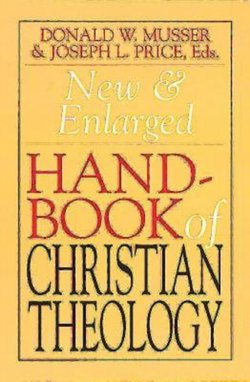Читать книгу New & Enlarged Handbook of Christian Theology - Donald W. Musser - Страница 50
На сайте Литреса книга снята с продажи.
ОглавлениеCREATIONISM
Creationism (“creation science” or “scientific creationism”) is the recent attempt by some conservative Christians to establish on scientific grounds that the created order was established suddenly from nothing (ex nihilo) in six days, that a catastrophic worldwide Noachic flood accounts for the earth’s geological features, that the biological theory of evolution is an insufficient account of origins, that humans and other primates are not related, and that the earth and its living creatures appeared recently. Hard creationists assert that the universe was created in six days about 10,000 years ago. Several versions of soft creationism allow for longer periods of creation and a considerably older creation. Recent polls show that up to 75 percent of the population favors equal time for creationist and evolutionary accounts of origins in the public schools. Several state legislatures mandated a “balanced treatment” of origins in public school science classes. Creationism is a complex phenomenon that includes (1) a theological component that rests on a literal reading of the Bible, especially Genesis 1–2; (2) a scientific component that claims that creation science is empirically grounded and not dependent on the Bible; and (3) a public component that seeks to disseminate its views to the wider society.
Creationism’s theological component contains both apologetic and polemic impulses. Based upon a literal reading of biblical texts, creationism ardently espouses the special creation of humans, a position that tends to minimize humanity’s connectedness to other living creatures. At the same time, creationists attack established biological science as providing an inadequate account of origins, and especially, a distorted view of humanity.
Creationism’s scientific component sets it apart from earlier anti-evolutionary thought. Creationists claim that empirical evidence supports a “young” earth. Because its proponents consider it a science, on the basis of fairness, they seek equal time with evolutionary biology in classrooms as a scientific theory of origins. Scientists, however, have almost unanimously also denied the scientific validity of creationism. Despite creationists’ rhetoric to the contrary, to date they have not established a recognized research program, have not published in respected scientific journals the results of research that have validated their position, and have not swayed scientists outside of their fundamentalist fold that their conclusions have any merit. A creation science research program is not impossible; yet presently no grounds warrant the conclusion that creation science is science.
Creationism’s public component has led to widespread public support for its positions. Media attention spotlighted attempts of the states of Arkansas and Louisiana in 1981 to legislate “equal time” in biology classes for its inclusion (with evolution) in the discussion of the origins of the universe and the earth. These laws were struck down because Federal courts concluded that creation science was inherently religious and, therefore, that teaching it in public schools was a violation of the first amendment of the Constitution. When the Supreme Court in 1987 (in a 7-2 split vote) rejected the Louisiana law, some pundits tolled the legal death knell of creation science. Legal battles will doubtless continue, however, due to strong public support for creationism and the zeal and organizational genius of its supporters. Especially prominent supporters of creationism have been the Institute for Creation Research (ICR) and the Creation Research Society (CRS), both based in California. The CRS was established by Henry Morris and Duane Gish in 1963 to pursue scientific research that would show that a “literal” (fundamentalist) understanding of the Genesis accounts of creation is consonant with modern science. The ICR is the chief publication (Creation-Life Publishers) and public relations arm (for example, the newsletter Acts and Facts) of the movement. Along with promoting creation science, its literature castigates the theory of evolution as an inadequate theory of origins that is aligned with an anti-Christian worldview.
Creationism rests on a literalist hermeneutic that asserts that biblical texts are without error. It seeks to prove the truth of biblical claims about natural history and natural processes by an empirical research program. Creationism, however, finds feeble support among biblical scholars because it reads the Genesis creation accounts as though they are empirically accurate when most scholars contend those texts should not be read as science or history. It has also convinced only a few scientists about the evidentiary claims of its research. Creationism’s major success has been to sway a large portion of the public (many of whom are not well informed about either science or theology) that it should be given “equal time” with evolution in science classrooms. Because of its public success, despite its shaky scholarly and scientific status, creationism remains a contentious topic in theology.
DONALD W. MUSSER
Bibliography
Lloyd R. Bailey, Genesis, Creation, and Creationism.
Tim M. Berra, Evolution and the Myth of Creationism.
Raymond A. Eve and Francis B. Harrold, eds., Cult Archaelogy and Creationism.
———, The Creationist Movement in Modern America.
Langdon Gilkey, Creationism on Trial.
Ronald L. Numbers, The Creationists.
Howard J. Van Till, Davis A. Young, and Clarence Menninga, Science Held Hostage: What’s Wrong with Creation-Science and Evolutionism.
Howard J. Van Till, Robert E. Snow, John H. Stek, and Davis A. Young, Portraits of Creation: Biblical and Scientific Perspectives on the World’s Formation.
Cross-Reference: Creation, Fundamentalism, Science and Christianity, Science and Theology.
CREED (See CONFESSIONAL THEOLOGY, DOGMATIC THEOLOGY, ECCLESIOLOGY.)
